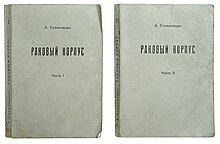 Cover of the 1st edition, Posev Publishing House, West Germany | |
| Author | Aleksandr Solzhenitsyn |
|---|---|
| Original title | Раковый корпус |
| Translator | Nicholas Bethell, 4th Baron Bethell, David Burg |
| Language | Russian |
| Genre | Semi-autobiographical novel, political fiction |
| Set in | Tashkent, 1955 |
| Publication place | Soviet Union |
Published in English |
|
| Media type | Print (hardback & paperback) |
| Pages | 446 |
| ISBN | 0-394-60499-7 |
| OCLC | 9576626 |
| 891.73/44 19 | |
| LC Class | PG3488.O4 R313 |
Cancer Ward (Russian: Раковый корпус, romanized: Rakovy korpus) is a semi-autobiographical novel by Nobel Prize-winning Russian author Aleksandr Solzhenitsyn.[1] Completed in 1966, the novel was distributed in Russia that year in samizdat, and banned there the following year.[2][3] In 1968, several European publishers published it in Russian, and in April 1968, excerpts in English appeared in the Times Literary Supplement in the UK without Solzhenitsyn's permission.[4][5] An unauthorized English translation was published that year, first by The Bodley Head in the UK, then by Dial Press in the US.[3]
Cancer Ward tells the story of a small group of patients in Ward 13, the cancer ward of a hospital in Tashkent, Soviet Uzbekistan, in 1955, two years after Joseph Stalin's death. A range of characters are depicted, including those who benefited from Stalinism, resisted, or acquiesced. Like Solzhenitsyn, the main character, the Russian Oleg Kostoglotov, spent time in a labor camp as a "counter-revolutionary" before he was exiled to Central Asia under Article 58.
The story explores the moral responsibility of those implicated in Stalin's Great Purge (1936–1938), during the murders of millions, sent to camps, or exiled. One patient worries a man he helped to jail will seek revenge, while others fear their failure to resist renders them as guilty as any other. "You haven't had to do much lying, do you understand? ..." one patient tells Kostoglotov. "You people were arrested, but we were herded into meetings to 'expose' you. They executed people like you, but they made us stand up and applaud the verdicts ... And not just applaud, they made us demand the firing squad, demand it!"[6]
Toward the end of the novel, Kostoglotov realizes the damage is too great, there will be no healing after Stalin. As with cancer, there may be periods of remission, but no escape.[7] On the day of his release from the hospital, he visits a zoo, seeing in the animals people he knew: "[D]eprived of their home surroundings, they lost the idea of rational freedom. It would only make things harder for them, suddenly to set them free."[8]
- ^ James M. Curtis, Solzhenitsyn's Traditional Imagination, University of Georgia Press, 2008, p. 61ff.
- ^ Joseph Pearce, Solzhenitsyn: A Soul in Exile, Ignatius Press, 2011, p. 184ff.
- ^ a b Patricia Blake, "A Diseased Body Politic", The New York Times, 27 October 1968.
- ^ "Cancer Ward", Encyclopædia Britannica.
- ^ Cite error: The named reference
Aikman2002p168was invoked but never defined (see the help page). - ^ Cancer Ward, pp. 436–437.
- ^ Jeffrey Meyers, "Cancer Ward and the Literature of Disease", Twentieth Century Literature, 29(1), Spring 1983 (pp. 54-68), p. 67. JSTOR 441143
- ^ Cancer Ward, p. 508.